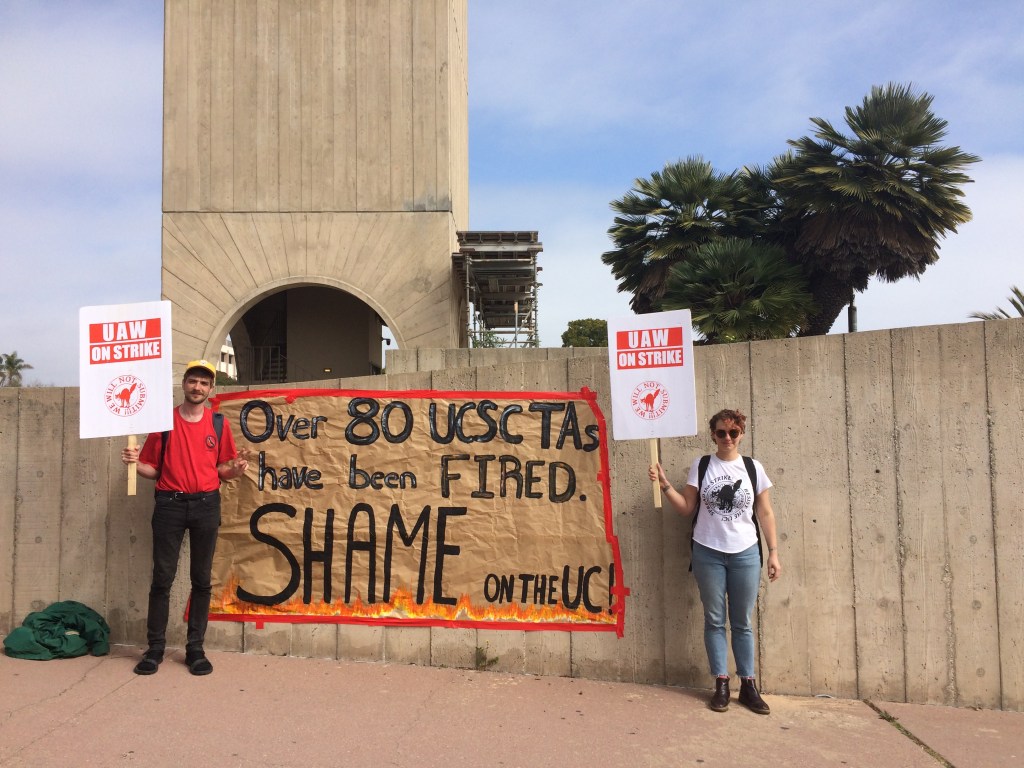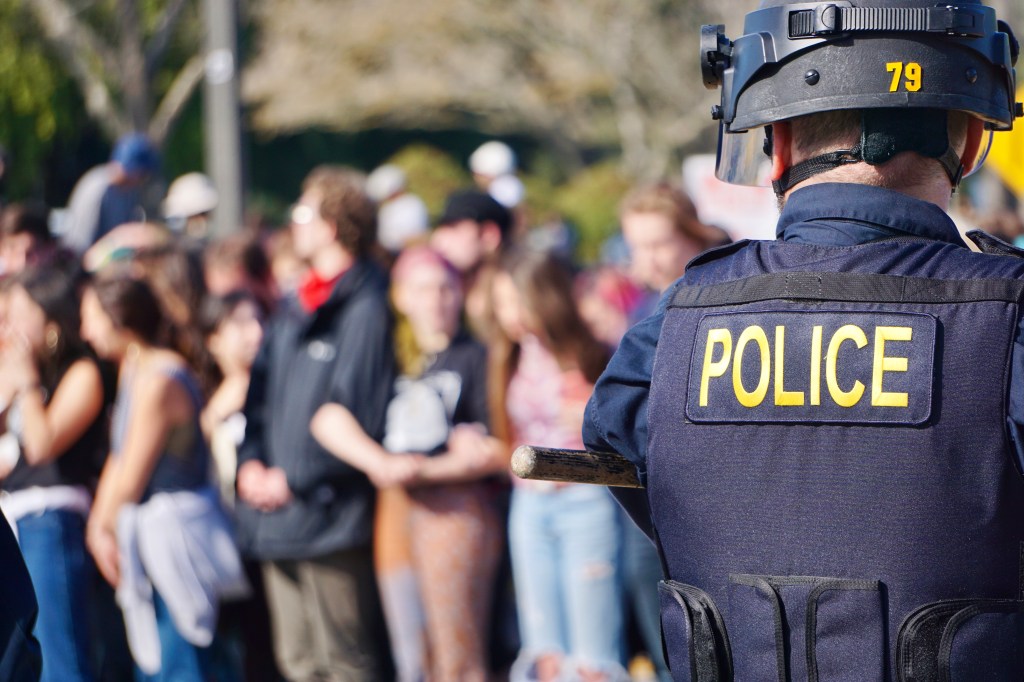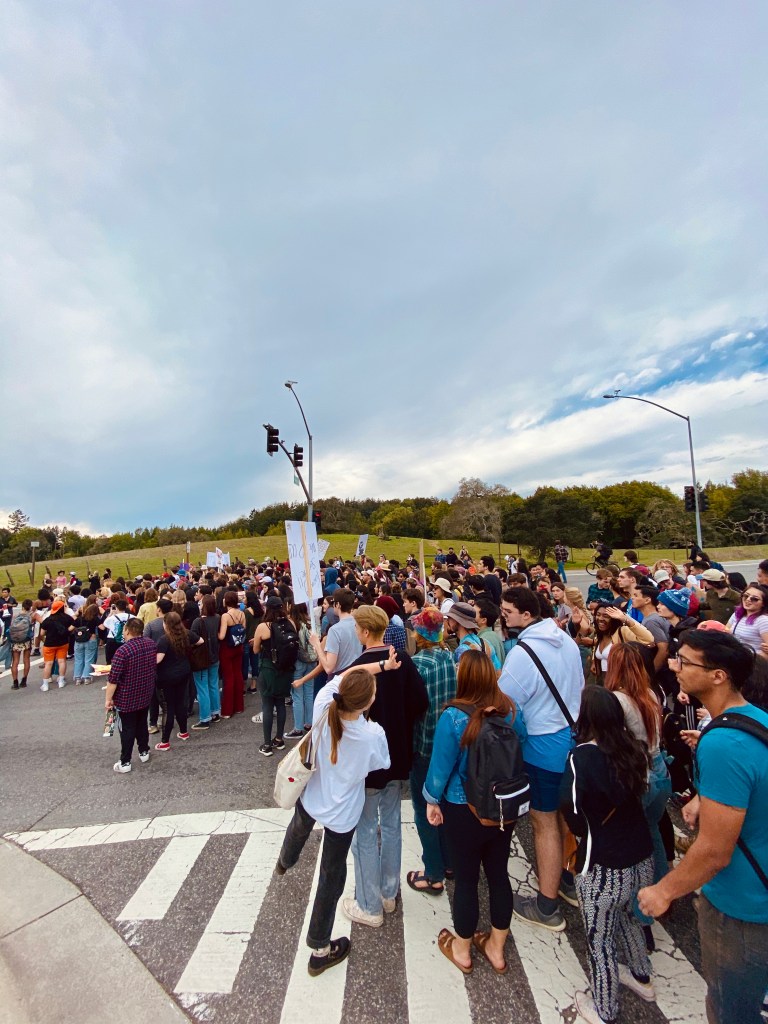by UCSC Wildcat Strikers
The Wildcat is Out of the Bag
“No one knows how to be a wildcat, so we’ll be figuring it out on the fly,” said one of the organizers on the day we voted to strike. Wildcat strikes—in which workers withhold their labor without authorization of their union—are rare in recent labor history so it’s no surprise that none of the UC Santa Cruz graduate student organizers had been a part of one before. “Sometimes we will mess up, but let’s be generous with each other and improvise,” continued the organizer. He was right: despite occasional hiccups, we have been successfully improvising and figuring things out on the fly.

We are on strike for a Cost of Living Adjustment (COLA) for all UCSC graduate students, who are typically paid $19,000 a year after tax, and spend most of their wages on rent. UCSC’s administration did not respond to teach-ins, rallies, marches, camp-outs, and speak-outs we held throughout early Fall quarter in which we voiced demands for a COLA. Organizers had considered a grade strike—in which we withhold final grades for undergraduate students we teach—in Spring 2020 as a final escalation after a year-long campaign for a raise. But we had to adjust our timeline when, in early December, rank-and-file student workers started calling for a strike in an email chain addressed to all grad students and UCSC administration. The day after the heated email exchange, we circulated a straw poll asking student workers if they were ready to strike and 350 people responded with a resolute “Yes.” We called for an emergency General Assembly meeting on a Sunday, right before finals week, to vote on how to proceed.
Embrace the Wildness of the Wildcat
Until the very last moment, some of the COLA organizers did not believe the strike was going to happen. We thought that maybe the straw poll would not be an indication of commitment; maybe people wouldn’t turn up for the meeting on a Sunday; maybe they wouldn’t have realized that we’d be going on a wildcat strike; maybe they wouldn’t be ready to risk their jobs for a COLA. And yet, around 350 graduate students went on a wildcat strike on December 8th, and, after nearly 80 striking student workers got fired at UCSC in February, the strike spread to other UC campuses—Santa Barbara, Davis, San Diego, Berkeley, and Irvine. “Embrace the wildness of the wildcat. You don’t need to gain majority approval to organize militant actions—do it if you have enough people. That’s the nature of the beast,” was our advice to organizers at other campuses.

So now, after months of striking, we can share some ways that you can be a wildcat. Overnight we built a strike website, composed a “How to Strike” manual, and released Strike FAQ guides for faculty, undergrads, and grad students. To make it official, we sent an email to the entire campus community announcing that graduate student workers voted to go on “an unauthorized wildcat strike, effective immediately.” We had dozens of department meetings and hundreds of one-on-one conversations about the strike. We ran Strike Headquarters—a table in the library where organizers strategized, talked to students, staff, and faculty, and distributed strike materials—every day we had new communiqués and flyers. We established a robust digital infrastructure for organizing. We formed working groups and committees for dealing with tactics, social media, fundraising, managing the website, media outreach, etc. When the grading strike escalated to a teaching strike as a response to the administrations’ threats of discipline, we began picketing near the entrance to the University.

Community Building
Our picket line was designed to be a place of teaching, learning, and community. Apart from picketing and chanting, we had daily teach-ins, lectures, performances, and workshops. With the help of undergraduate students, we organized free childcare, food, and first aid at the picket line. Artists, scholars, activists, and thinkers have spoken at the picket and used it as a space of radical learning. Conversations about divestment from the Thirty Meter Telescope, reparations to the indigenous tribal band Amah Mutsun, disarming campus police, meeting demands of undocumented students, enacting anti-racist politics and other abolitionists practices were happening at the picket every day. Hundreds of COLA supporters (grads, undergrads, faculty, staff, and community members) participated in civil disobedience actions, including the campus shut down, stand-offs with riot police, and dining hall “liberations,” in which we safely ushered people past cashier stations and encouraged everyone to eat for free.

We heard from students and community members who joined us at the picket line every day for four weeks that, while they wanted us to win, they didn’t want the picket to end. The sense of community and solidarity that the strike created was felt by everyone at the picket. Since we took the strike vote at the General Assembly in December and every hand in the room went up, we solidified as a collective and we continue building our collective power as we persist with the strike. We are using the Strike Fund to take care of student workers who got fired and, since the COVID-19 pandemic, we have been working on expanding our mutual aid campaign to support other students and community members in need.
Organizing Online
The public health crisis led the University of California to move Winter final exams and Spring classes online—they should be held on the digital platform called Zoom. Strike organizing also moved online: the digital picket line means that strikers will be withholding students’ Winter grades and won’t teach over Zoom. Even digitally, we continue to organize and build community—this time with other UCs who joined the fight for COLA. Graduate and undergraduate students across the state now participate in digital organizing meetings, general assemblies, and hang-outs. Our latest UC-wide project is a Strike University—a free and public curriculum that strikers will be teaching online.
The fight for COLA is not just about our survival but about who has access to the academy. With this wildcat strike now spreading across the state, we are organizing and taking collective action to have greater control over our workplaces and learning environments. We are fighting back against austerity and budget cuts. We are fighting against racist policies that increase funding for police on campuses but don’t reduce the cost of textbooks or tuition. We are fighting for equal access to the vocation of teaching and research. We want to see an academy that is accessible to BBIPOC, trans and queer, undocumented and international, disabled, and poor students. All people deserve the opportunity to teach and learn in the community, not just those whose family can subsidize their graduate education. Until then, we strike!

UCSC Wildcat Strikers—We are hundreds of UC Santa Cruz graduate students striking for a living wage and fair labor conditions.


Pingback: Conference: Remaking the University in Our Image – The Activist History Review
Pingback: Activist Adjuncts: Reimagining Power and Privilege Through Antiracist Pedagogy – The Activist History Review
Pingback: University of California workers lead largest academic strike in US history - Waging Nonviolence | Waging Nonviolence